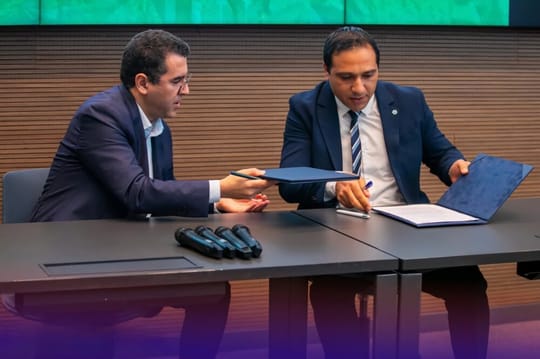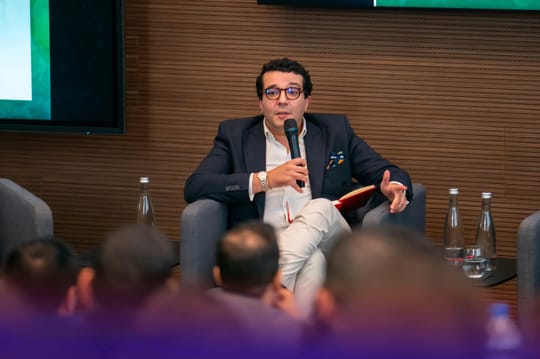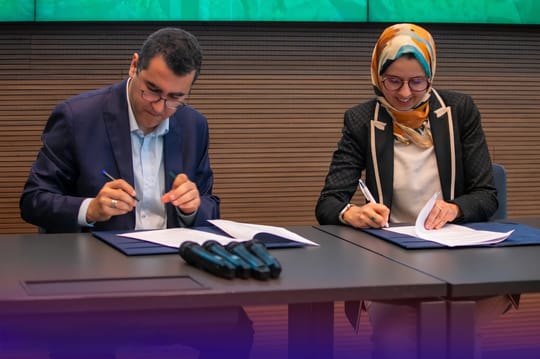Creating a Green Economy: Insights from the 2025 Carbon Markets Forum in Rabat

I had the privilege of attending the Carbon Markets Forum on April 28, 2025, held at the Africa Business School (UM6P Campus) in Rabat. The forum gathered government officials, private investors, and sustainability experts from across Africa. Key topics included Article 6 of the Paris Agreement, voluntary carbon markets, and how Morocco can strengthen its carbon market ecosystem. I participated in sessions featuring speakers from institutions such as Casablanca Finance City (CFC) and the Global Green Growth Institute (GGGI).
The opening speech was delivered by Mr. Zakaria Hachlaf, Secretary General of the Ministry of Energy Transition and Sustainable Development. He emphasized the importance of supporting innovative projects that help reduce greenhouse gas emissions and strengthen climate resilience in Morocco and Africa.
The forum highlighted CFC’s expanding role in carbon finance. A recent announcement confirmed a partnership between CFC CEO Said Ibrahimi and CDG (Deposit and Management Fund, the state-owned financial institution) to establish a voluntary carbon market. Mr. Aziz El Khyari, CFC’s Business Development Director, participated in a professional capacity.
During the event, two important partnership agreements were signed, each aimed at advancing Morocco's efforts in carbon market development.
Mr. Anas Felhi, representing the KliK Foundation (Switzerland), which was created to help offset carbon emissions from the Swiss transport sector under the Swiss CO2 Act, also presented the foundation involvement in international climate projects, particularly in Morocco.
One of the key projects highlighted was the “Solar Rooftop 500” program. This initiative aims to support the installation of 500 MWp of photovoltaic systems on rooftops in Morocco’s commercial and industrial sectors by 2030. The project aligns with Morocco’s nationally determined contributions and utilizes an advanced Measurement, Reporting, and Verification platform to ensure transparency and accuracy in generating internationally transferable mitigation outcomes.

A key theme of the forum was the urgent need for a clear national roadmap for developing the carbon market.
Quality and Transparency: A strong message at the event was that carbon projects must be transparent and credits must be high quality. Speakers emphasized building trust in the system. This mirrors advice from experts: for example, the World Economic Forum notes that trust in carbon markets “hinges on transparency” and that robust reporting is key to guarantee the quality and credibility of carbon projects. In other words, we all agreed that the carbon units (credits) need strict oversight and public data so people can be sure the claimed emissions cuts are real.
Building Skills and Capacity: Another clear focus was training and capacity building in Morocco’s carbon sector. Panelists stressed that companies and officials need new skills. This aligns with recent GGGI reports: they ran intensive workshops to give Moroccan officials the “much-needed capacity” to create and use carbon credits under Article 6. Those training aim to make Morocco an active leader in international carbon trades. The forum underscored that strengthening expertise at universities, in government, and in industry, is essential if Morocco is to successfully run its carbon market.
What is Article 6 (and voluntary carbon markets)? Many discussions assume people know the basics, but here’s a quick refresher. Article 6 of the Paris Agreement is the part that lets countries trade emission reductions. Under Article 6, countries can voluntarily cooperate by buying and selling “carbon credits” from each other’s emission-cutting projects. One country can finance a clean-energy project in another country and count those emissions cuts toward its climate goals. Article 6.2 covers direct trades between countries, while Article 6.4 sets up a UN-backed crediting mechanism (a bit like the old Kyoto clean development mechanism).

UM6P and the Tony Blair Institute: Announced by Sara Boukhobza, this collaboration develops strategies and policies to support climate and carbon initiatives.
Voluntary carbon markets (VCMs) are slightly different: they are markets where companies or individuals buy credits on their own initiative (not under government targets). In a VCM, a company that can’t avoid some emissions can offset them by buying credits from projects that remove or reduce greenhouse gases. Each credit represents one ton of CO₂ (or equivalent) not emitted or captured.
For example, a reforestation project issues credits for carbon it stores in trees. The buyer then “retires” those credits to claim an offset. As one summary explains: “Voluntary carbon markets allow carbon emitters to offset their unavoidable emissions by purchasing carbon credits from projects targeted at removing or reducing GHG (greenhouse gases) from the atmosphere.”. The forum made clear that Morocco aims to link into both these international market systems, using Article 6 rules and high-quality voluntary projects to mobilize finance for emissions cuts.
In summary, the Carbon Market Forum 2025 in Rabat was very informative. It showed that Morocco is gearing up to play a big role in carbon finance. I learned that Article 6 will let Morocco trade emissions cuts with other countries, and that a voluntary carbon market is being set up here. Partnerships with groups like the Tony Blair Institute and GGGI were announced to help build policy and technical knowledge.
Importantly, speakers insisted on making sure that projects are transparent and credit quality is high, and on training people to run these markets in Morocco. All in all, it was clear that the future of carbon finance in Morocco depends on strong institutions and skilled people, as well as clear rules from Article 6 and voluntary markets to guide the way.